Iran Official Says Tehran Ready To Accept EU Nuclear Deal Draft
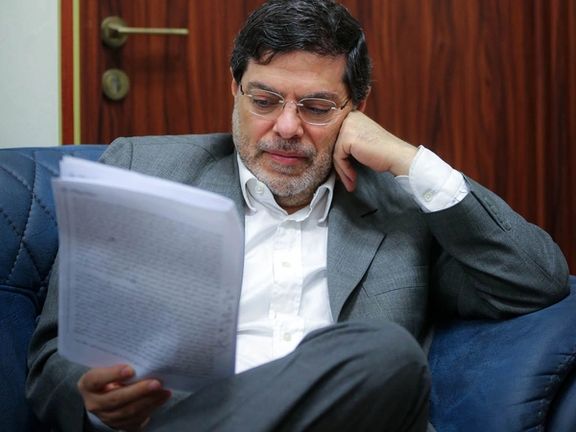
An advisor to Iran’s negotiating team has said that Tehran is prepared to reach an agreement in nuclear talks based on a document presented to the parties last year.

An advisor to Iran’s negotiating team has said that Tehran is prepared to reach an agreement in nuclear talks based on a document presented to the parties last year.
Mohammad Marandi, who is introduced as “media advisor” to the Islamic Republic’s negotiating team was quoted by Al Mayadeen television close to Tehran as saying that Iran is ready to reach agreement based on a text presented by the European Union.
Marandi’s comment comes as Iran’s economic crisis worsens, with its currency losing half its value in 8 months and prices doubling in this period.
After 18 months of indirect talks with the United States in Vienna, the EU acting as mediator in the negotiations, presented a compromise text in August 2022 to all JCPOA parties involved, asking for their final input.
Although Iran and the US never rejected the draft agreement, Washington dismissed Iran’s response to the document as unacceptable, because it contained “extraneous demands.”
The US announced in October that pursuing the nuclear talks was not a priority any longer, as Iran used deadly force against anti-regime protesters and began supplying killer drones to Russia.
Marandi, who is in the inner circle of Iran’s hardliners, argued last year that the war in Ukraine and the cut in Russian energy supplies would leave the Europeans in a winter freeze and Tehran would get strong leverage on the nuclear issue.
Since then, Europe successfully replaced Russian natural gas supplies and avoided any major problems.
Some in Iranian media later ridiculed the idea of counting on a “European freeze” and throwing away the chance for a nuclear deal that would have lift US sanctions.
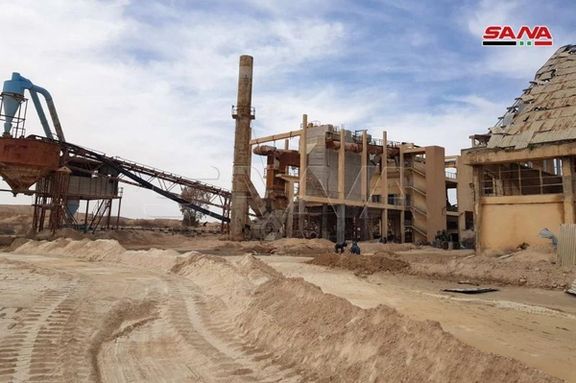
While President Ebrahim Raisi is in Syria, classified information obtained shows Tehran is procuring uranium from phosphate mines in Syria to make yellowcake.
According to the secret documents received by Iran International, the Atomic Energy Organization of Iran (AEOI) had asked the government to let the agency import 800,000 tons of phosphate from the mines under the Islamic Republic’s control in Syria without paying the share of the administration.
One of the documents is a letter issued in January by Mojtaba Hosseinipour, a deputy at the president’s office, addressing Minister of Economic and Financial Affairs Ehsan Khandozi and Reza Fatemi Amin, the former Minister of Industry, Mines and Business who was sacked this week, as well as former head of Iran's Planning and Budget Organization Masoud Mirkazemi and Mohammad Dehghan, Raisi’s deputy in legal matters.
In the letter, the office of the president has asked the officials to decide whether or not they can give the green light to the nuclear agency for “the annual purchase of phosphates from Syria without paying the government’s share.”
In 2017, Tehran and Damascus signed a memorandum of understanding to cooperate in a phosphate mine in Syria’s Al-Sharqiya. Syria is among the world’s largest exporters of the rock phosphate, a raw material used in the production of phosphatic fertilizers. The main use of phosphate is production of fertilizers, but the rock is also an unconventional source to extract uranium, explained in another document attached to the letter.
While EU sanctions on Syria do not explicitly prohibit phosphate imports, they do ban deals with the Syrian minister of oil and mineral resources, who is in charge of phosphates. Cheap Syrian phosphate exports to Europe have boomed in recent years, The Guardian reported in January 2022, noting that European farmers are dependent on phosphate fertilizers. Anyhow, it seems that the Islamic Republic has found another way around sanctions to advance its nuclear program.
Another letter included in the bundle of documents is by the head of Iran’s atomic agency, Mohammad Eslami, who asked Raisi’s first deputy Mohammad Mokhber to allow the purchase of the product from Syria.
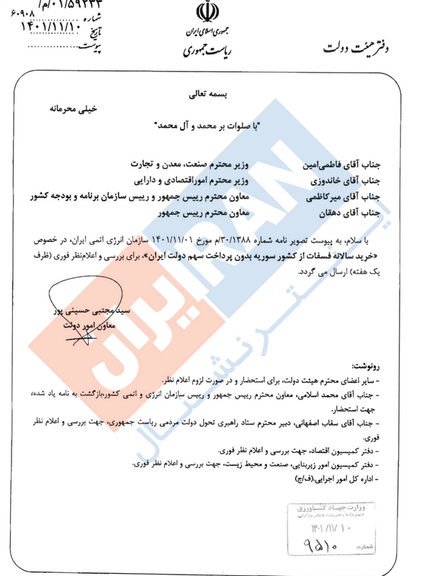
“In order to supply part of the uranium needed for the country's nuclear industry, this organization (AEOI) is mulling a project to extract uranium from Syria’s phosphate mines, the exploitation of which is at the disposal of the Islamic Republic,” Eslami wrote.
“Due to the high grade of uranium in the phosphate soil of these mines, the extraction of the element and the preparation of yellowcake from it is technically more feasible than the extraction of uranium from low-grade radioactive mines of Iran,” he added, requesting the cabinet to give the go-ahead for the project without paying the government.
Yellowcake is used in the preparation of uranium fuel for nuclear reactors, for which it is smelted into purified uranium dioxide for use in fuel rods for pressurized heavy-water reactors and other systems that use natural unenriched uranium. It has both civilian use as well as application for weapons but it should be processed further. Highly enriched uranium can be blended down with uranium containing low levels of U-235 to produce low-enriched uranium -- less than 5% U-235 -- fuel for power reactors. Further processing can yield weapons-grade uranium with U-235 levels usually above 90%, suitable for nuclear weapons.
In an appendix attached to the letter, the nuclear agency said that there are two main sources for extracting uranium, but the Islamic Republic is barred from using the conventional sources under international sanctions.
It has been forced to resort to unconventional sources in which uranium is extracted as a byproduct, such as is the case for phosphate soil.Khunayfis mine in Homs Governorate with 300 million tons of phosphates is the better choice among the mines under contract with Iran because it has a higher amount of uranium, according to the document.
The presidents of Iran and Syria on Wednesday signed a long-term strategic cooperation agreement, including a memorandum of understanding on oil industry cooperation.
The signing came during a visit by Raisi to Damascus for talks with his Syrian counterpart Bashar al-Assad, in the first such visit by an Iranian head of state since war broke out in Syria in 2011. Tehran is helping Syria rebuild its roads, airports, power stations and ports — potentially benefiting the Revolutionary Guards, which own the biggest construction firms in Iran.
In March, the E3, made up of France, Germany and the UK, issued a tough statement addressing IAEA Board of Governors, demanding immediate response to Iran’s 84-percent uranium enrichment.
While the US responded to the IAEA chief’s visit to Tehran with a cautious approach, waiting to see what the outcomes would be, the E3 said the enrichment at up to 83.7% U-235 is an “extremely grave escalation” which comes against the highly concerning backdrop of continued accumulation of high enriched uranium up to 60% and Iran continuing to expand its enrichment capabilities.
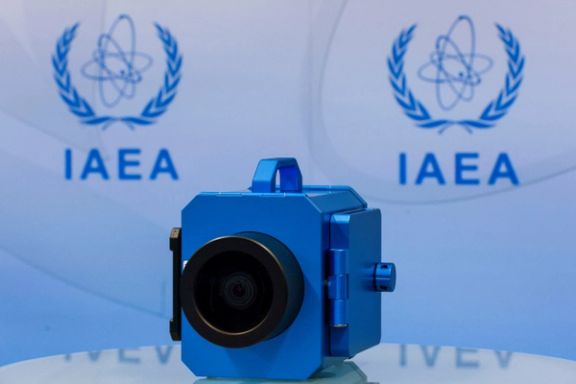
The International Atomic Energy Agency started re-installing the removed surveillance cameras in Iran.
After Western powers introduced a resolution in June 2022 to censure Iran over its nuclear program, Iran turned off a number of nuclear watchdog cameras.
In an interview with PBS NewsHour on Monday, IAEA Director-General Rafael Mariano Grossi said the agency is installing cameras and reconnecting some online monitoring systems.
The IAEA is responsible for monitoring and verifying Iran’s compliance with the 2015 nuclear deal, which limited the country’s nuclear activities in exchange for sanctions relief.
Iran has been gradually scaling back its commitments under the deal in response to the US withdrawal from the agreement and the re-imposition of sanctions.
The IAEA has been able to continue its monitoring of Iran’s nuclear program through other means, including satellite imagery, but the loss of the cameras raised concerns about the agency’s ability to detect any potential covert activities.
On March 4, 2023, Iran and the IAEA agreed to a new plan to allow the agency to reinstall certain surveillance equipment in the country.
As soon as the agreement was announced, the Atomic Energy Organization of Iran and IAEA offered different interpretations about what it would include, raising questions about its implementation.
Grossi did not indicate whether Iran would allow the agency to install an online enrichment monitor at Fordow where the agency detected 84 percent enriched uranium in January.
In addition, he did not address whether the IAEA would have access to the recordings made by the cameras or whether Tehran would turn over the data only if the JCPOA was restored.
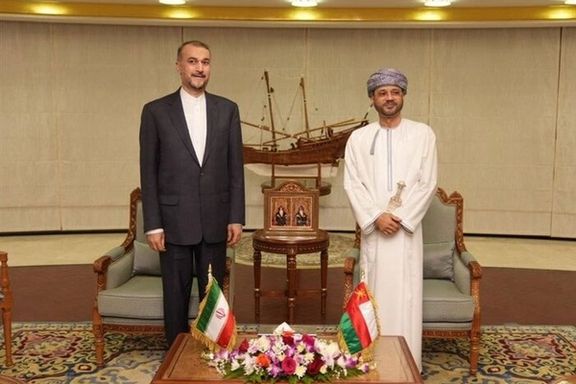
Iran’s foreign minister Hossein Amir-Abdollahian during a visit to Oman has discussed the conflict in Yemen and the status of Iran’s nuclear talks with the West.
Iran’s official news agency IRNA reported Wednesday that Amir-Abdollahian met with Oman’s foreign minister Sayyid Badr Albusaidi and thanked him for mediation efforts by Sultan Haitham bin Tariq and the government of Oman “for their positive role” in JCPOA nuclear talks.
IRNA quoted Amir-Abdollahian as saying, “In addition to issues relating to expanding relations, I discussed regional issues with my Omani counterpart, as well as international problems, such as Palestine, Yemeni reconciliation and the situation in Sudan.”
IRNA commented that Oman has played an important role in Iran’s nuclear talks, “exchange of prisoners between Iran and the West”, and contacts between Iran and Saudi Arabia.
Oman has long played a mediating role between Tehran and Washington. First contacts in 2013 to launch nuclear talks were facilitated by Oman.
Meanwhile, Russian foreign minister Sergei Lavrov visiting the United Nations in New York, told reporters during a news conference on Tuesday that the revival of the JCPOA nuclear deal does not depend on Russia, China or Iran, indirectly accusing the United States for freezing talks.
The European Union presented a compromise agreement draft to Iran and Western powers last August, after 18 months of talks, but the United States accused Iran of stonewalling and presenting “extraneous” demands. In October, Washington said it is not focused on the talks any longer, demanding that Iran stop weapons supplies to Russia, among other things.
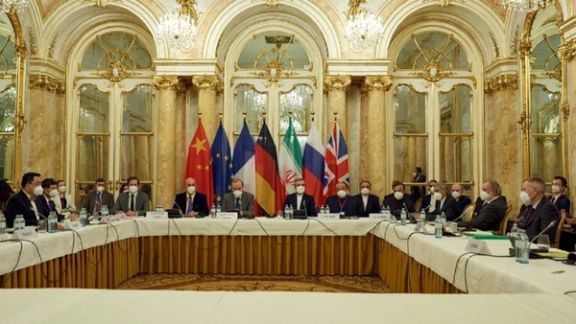
Iranian media have been expressing renewed concerns lately over the unclear fate of the country's 2015 nuclear deal with world powers.
Reformist daily Shargh wrote in a commentary on April 20 that economic, political and social conditions in Iran are fragile and the three challenges of Iran's involvement in the Ukraine war, differences with International Atomic Agency (IAEA) over "safeguard" issues and the Iranian regime's human rights record cast a shadow of doubt over the future of the nuclear deal (JCPOA).
Media commentator and former diplomat Ali Bigdeli wrote in a commentary in Etemad Online that the revival of the nuclear deal is the prerequisite for maintaining relations with all the of the regional countries. Bigdeli added that "although Saudi Arabia has said that it is prepared to invest in Iran, no investment will be possible without first solving the problem of the JCPOA."
During the past six weeks, media in Tehran have been discussing the implications of Iran's rapprochement with Saudi Arabia on the future of Tehran's foreign policy and developments in West Asia and beyond. The media generally believe that the resumption of ties between Tehran and Riyadh is a prelude to a wider range of developments in Yemen and Syria and will also positively affect ties between Saudi Arabia and Palestinian groups, Shargh wrote.
Shargh newspaper argued that the improved relations with Riyadh can also lead to the mending of Iran's regional ties with countries such as Bahrain, Jordan and Egypt.
However, the significance of the rapprochement with Saudi Arabia has even overshadowed by other issues such as the fate of Iran's nuclear program and Tehran's negotiations with the United States to revive the JCPOA. But a key question is whether Iran now believes it no longer needs to settle its differences with the IAEA and revive the nuclear deal.

The spokesman for the Iranian Foreign Ministry Naser Kanaani has responded to the same question by reiterating that the current government in Iran will not mix the issue of a nuclear agreement with key economic issues or diplomacy in other areas.
Kanaani further said that Tehran will benefit from the rapprochement with Riyadh to serve its interests and enhance its coordination with regional countries and beyond.
Regardless of how consistent the spokesman's statement is with what is taking place on the ground, Shargh noted, that Iran's relations with Saudi Arabia are affected by international developments. Shargh argued in the commentary that Iran cannot ignore the significance of reviving the JCOA in its international relations. If Tehran mends its ties with the big powers, its regional relations will also be put on the right track.
Bigdeli in his commentary maintained that Saudi Arabia's first motivation for the rapprochement with Iran was end the Yemeni crisis. Riyadh needed to end the conflict in Yemen to be able to further major development projects on the shores of the Red Sea. Riyadh also needed security for its $500 billion project to build a new city. Bigdeli added that Riyadh has undertaken to reconstruct Yemen, pay the government employees’ deferred salaries and create a central government in Sana.
For Iran, the benefit was to end it isolation in the region. Nonetheless, Iran is eyeing the diplomatic rather than the economic benefits of the restoration of its ties with Saudi Arabia. Without resolving the JCPOA issue and opening the international banking system shut off by US sanctions, no one can invest in Iran. Bigdeli added that even an interim agreement with the United States will not solve Iran's problems although it may instil hope in Tehran.

Iran's nuclear chief Mohammad Eslami says Tehran and UN atomic watchdog, the IAEA, are in constant contact and talks between the two sides are progressing.
Eslami said Tuesday that the talks with the International Atomic Energy Agency are pursued and experts report daily on the progress.
Meanwhile, in a communique, G7 foreign ministers meeting in Japan reiterated Tuesday that Iran should never develop nuclear weapons.
“We call on Iran to fulfil its legal obligations and political commitments regarding nuclear non-proliferation without further delay,” G7’s final communique said.
Additionally, the G7 ministers expressed concern over Iranian destabilizing activities in the region and weapons transfers to Russia.
During a trip to Tehran in early March, IAEA's director Rafael Grossi said he reached an agreement to ensure Iran's full cooperation and said more meetings would take place soon.
His visit came amid discussions with Iran about uranium particles enriched to up to 83.7% purity, very close to weapons grade, at its Fordow enrichment plant.
Iran claims its nuclear program is for peaceful purposes only. However, the US and its allies suspect that the Islamic Republic is seeking to develop nuclear weapons. The US imposed strict economic sanctions on the country in an effort to force it to change course.
Iran signed an agreement with six major world powers in 2015 in exchange for relief from US, European Union, and UN sanctions on its nuclear program.
However, former US President Donald Trump reneged on the deal in 2018, restoring harsh US sanctions, which resulted in Iran violating the deal's nuclear limits.